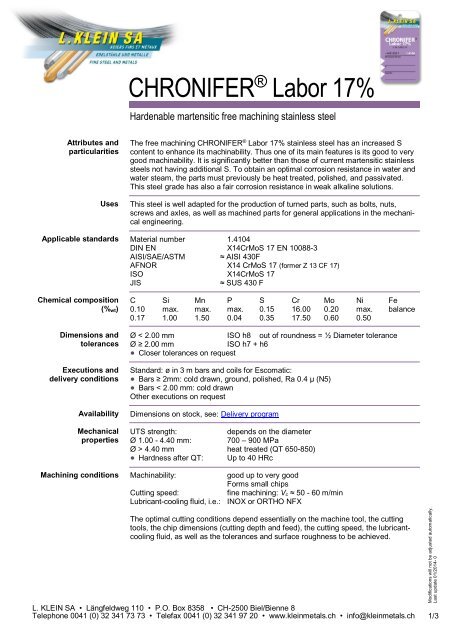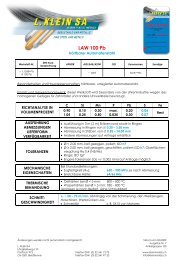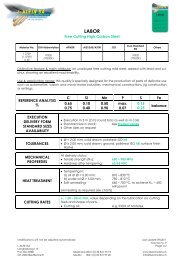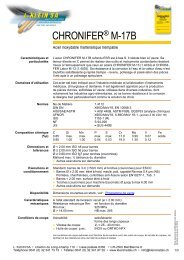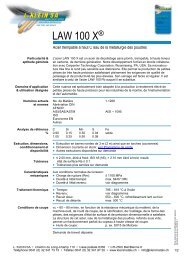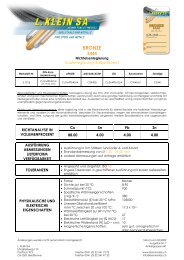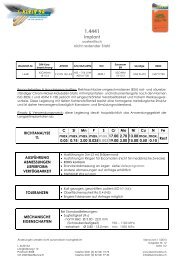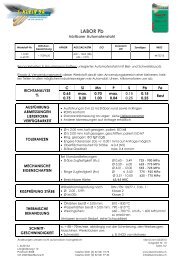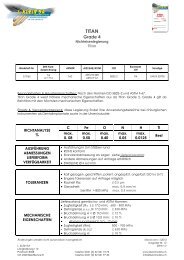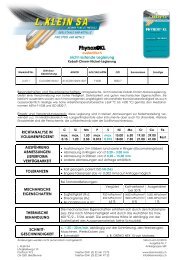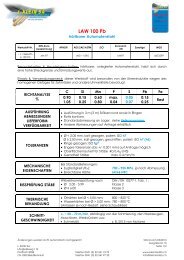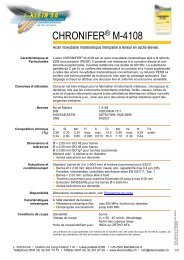Hardenable Stainless Steel C Si Mn P S Cr Mo Ni Fe REFERENCE ...
Hardenable Stainless Steel C Si Mn P S Cr Mo Ni Fe REFERENCE ...
Hardenable Stainless Steel C Si Mn P S Cr Mo Ni Fe REFERENCE ...
Create successful ePaper yourself
Turn your PDF publications into a flip-book with our unique Google optimized e-Paper software.
<strong>Mo</strong>difications will not be adjusted automatically.<br />
Last update 01/2014- 0<br />
CHRONIFER ® Labor 17%<br />
<strong>Hardenable</strong> martensitic free machining stainless steel<br />
Attributes and<br />
particularities<br />
Uses<br />
Applicable standards<br />
Chemical composition<br />
(% wt)<br />
Dimensions and<br />
tolerances<br />
Executions and<br />
delivery conditions<br />
Availability<br />
Mechanical<br />
properties<br />
Machining conditions<br />
The free machining CHRONIFER ® Labor 17% stainless steel has an increased S<br />
content to enhance its machinability. Thus one of its main features is its good to very<br />
good machinability. It is significantly better than those of current martensitic stainless<br />
steels not having additional S. To obtain an optimal corrosion resistance in water and<br />
water steam, the parts must previously be heat treated, polished, and passivated.<br />
This steel grade has also a fair corrosion resistance in weak alkaline solutions.<br />
This steel is well adapted for the production of turned parts, such as bolts, nuts,<br />
screws and axles, as well as machined parts for general applications in the mechanical<br />
engineering.<br />
Material number 1.4104<br />
DIN EN X14<strong>Cr</strong><strong>Mo</strong>S 17 EN 10088-3<br />
AISI/SAE/ASTM ≈ AISI 430F<br />
AFNOR X14 <strong>Cr</strong><strong>Mo</strong>S 17 (former Z 13 CF 17)<br />
ISO X14<strong>Cr</strong><strong>Mo</strong>S 17<br />
JIS<br />
≈ SUS 430 F<br />
C <strong>Si</strong> <strong>Mn</strong> P S <strong>Cr</strong> <strong>Mo</strong> <strong>Ni</strong> <strong>Fe</strong><br />
0.10 max. max. max. 0.15 16.00 0.20 max. balance<br />
0.17 1.00 1.50 0.04 0.35 17.50 0.60 0.50<br />
Ø < 2.00 mm ISO h8 out of roundness = ½ Diameter tolerance<br />
Ø ≥ 2.00 mm<br />
ISO h7 + h6<br />
• Closer tolerances on request<br />
Standard: ø in 3 m bars and coils for Escomatic:<br />
Bars ≥ 2mm: cold drawn, ground, polished, Ra 0.4 µ (N5)<br />
• Bars < 2.00 mm: cold drawn<br />
Other executions on request<br />
Dimensions on stock, see: Delivery program<br />
UTS strength:<br />
depends on the diameter<br />
Ø 1.00 - 4.40 mm: 700 – 900 MPa<br />
Ø > 4.40 mm heat treated (QT 650-850)<br />
• Hardness after QT: Up to 40 HRc<br />
Machinability:<br />
good up to very good<br />
Forms small chips<br />
Cutting speed:<br />
fine machining: V c ≈ 50 - 60 m/min<br />
Lubricant-cooling fluid, i.e.: INOX or ORTHO NFX<br />
The optimal cutting conditions depend essentially on the machine tool, the cutting<br />
tools, the chip dimensions (cutting depth and feed), the cutting speed, the lubricantcooling<br />
fluid, as well as the tolerances and surface roughness to be achieved.<br />
L. KLEIN SA • Längfeldweg 110 • P.O. Box 8358 • CH-2500 Biel/Bienne 8<br />
Telephone 0041 (0) 32 341 73 73 • Telefax 0041 (0) 32 341 97 20 • www.kleinmetals.ch • info@kleinmetals.ch<br />
1/3
<strong>Mo</strong>difications will not be adjusted automatically.<br />
Last update 01/2014- 0<br />
CHRONIFER ® Labor 17%<br />
<strong>Hardenable</strong> martensitic free machining stainless steel<br />
Machining conditions<br />
CNC-turning<br />
Machining conditions<br />
on automatic lathes<br />
Large diameters<br />
Forming<br />
Welding<br />
Annealing<br />
Heat treatments<br />
Quenching<br />
Tempering<br />
Tempering diagram<br />
Depth of cut (mm) 6 3 1<br />
Condition UTS (MPa) <strong>Fe</strong>ed (mm/r) 0.5 0.4 0.2<br />
Annealed 650-720°C Cutting speed (m/min) 250 300 380<br />
Depth of cut (mm) 6 3 1<br />
Condition UTS (MPa) <strong>Fe</strong>ed (mm/r) 0.5 0.4 0.2<br />
Annealed 650 – 720 Cutting speed (m/min) 140 155 165<br />
QT condition 750 – 700 125 140 165<br />
Warm: Forging: 1150 – 950°C (Pre-heating at 1150 – 1230°C)<br />
Not recommended below 930°C.<br />
• The numerous inclusions of manganese sulfides (<strong>Mn</strong>S) may initiate forging cracks.<br />
Cold: Limited. Not recommended.<br />
Not recommended.<br />
• The numerous manganese sulfides (<strong>Mn</strong>S) inclusions can significantly hamper or<br />
even impede the welding process.<br />
Soft anneal: 800 – 820°C, UTS ≤ 730 MPa, A5 ≥ 15%<br />
• Because of the danger of carbide formation the annealing temperature should not<br />
exceed 825°C.<br />
Stress relieving anneal (sub-critical): 650 – 760°C, air cooling<br />
Primary quenching: 950 – 1050°C, oil quenching<br />
Option: secondary quenching by sub-zero cooling<br />
-20 up to -80°C/12 – 48h, preferably -80°C/12 – 24h<br />
or by cooling to cryo-temperature<br />
-196°C/12 – 24h: step-by-step cooling to avoid any possible thermal cracking.<br />
<strong>Mo</strong>re info<br />
Tempering according to one’s need. See diagram<br />
• Because of a potential cracking risk the domain 400 – 580°C should be avoided.<br />
L. KLEIN SA • Längfeldweg 110 • P.O. Box 8358 • CH-2500 Biel/Bienne 8<br />
Telephone 0041 (0) 32 341 73 73 • Telefax 0041 (0) 32 341 97 20 • www.kleinmetals.ch • info@kleinmetals.ch<br />
2/3
<strong>Mo</strong>difications will not be adjusted automatically.<br />
Last update 01/2014- 0<br />
CHRONIFER ® Labor 17%<br />
<strong>Hardenable</strong> martensitic free machining stainless steel<br />
Microstructure<br />
Polishing<br />
Laser marking<br />
Passivation<br />
Corrosion resistance<br />
Delivery condition and “annealed + cold drawing” condition: ferrite + carbide<br />
• Machining: ferrite + carbide<br />
Quenched and tempered QT: martensite + carbide<br />
Hard machining: martensite + carbide<br />
Microstructure for an optimal polishing: stress relieved martensite + carbide<br />
• Condition for polishing: martensite + carbide<br />
Optimal: QT quenched and tempered < 200°C<br />
This steel grade is not adapted for miror polish.<br />
• The numerous inclusions of manganese sulfide (<strong>Mn</strong>S) impair the polishing and decrease<br />
its material yield as well as the process economy.<br />
The numerous manganese sulfide (<strong>Mn</strong>S) inclusions impair the laser marking.<br />
•<br />
The Heat Affected Zone (HAZ) alters locally the microstructure and may reduce its<br />
corrosion resistance. <strong>Mo</strong>re info<br />
The adequacy of the selected passivation process should be checked with respect to<br />
the numerous <strong>Mn</strong>S inclusions of this free machining grade.<br />
• The numerous manganese sulfide (<strong>Mn</strong>S) inclusions may significantly impair the<br />
quality of the passivation process. A pickling prior to passivation is highly<br />
recomended. It should not be reasonably skipped over. <strong>Mo</strong>re info<br />
Optimum: Clean, quenched, tempered, fine polished, and passivated surfaces.<br />
• The numerous inclusions of manganese sulfide (<strong>Mn</strong>S) increase the sensitivity to<br />
pitting corrosion.<br />
• Conditions to avoid: annealed and “annealed+ cold deformed”. These conditions<br />
should be avoided because of the increased corrosion risk. They are definitively<br />
not recommended for the permanent use of parts.<br />
• The possible formation of oxides and scaling can strongly decrease the corrosion<br />
resistance. These oxidations should always be eliminated either mechanically by<br />
an abrasion process, or better, by pickling.<br />
• The simplest and easiest precaution is always to keep the parts clean, free of<br />
working residues, polished, and correctly dried.<br />
• Use only chlorine free disinfection solutions, cleaning and washing solutions and<br />
products. <strong>Mo</strong>re info<br />
Physical properties Properties Units Temperature (°C)<br />
20 200 300 400 500<br />
Density g cm -3 7.70<br />
Young <strong>Mo</strong>dulus E GPa 215<br />
Electrical resistance Ω mm 2 m -1 0.70<br />
Thermal expansion m m -1 K -1 20–100°C 20–200°C 20–300°C 20–400°C 20–500°C<br />
10 -6 10.5 10.5 10.5 10.5<br />
Heat conductivity W m -1 K -1 25 28.7<br />
Specific heat J kg -1 K -1 460<br />
Melting range Melting-Solidification range: 1510 – 1425 °C<br />
Magnetism us<br />
<strong>Fe</strong>rromagnetic, can be magnetized. <strong>Mo</strong>re info<br />
Disclaimer: The information and data of this informative “Data sheet“ are indicative only. They are not use instructions.<br />
The users must define and endorse them in each case.<br />
L. KLEIN SA • Längfeldweg 110 • P.O. Box 8358 • CH-2500 Biel/Bienne 8<br />
Telephone 0041 (0) 32 341 73 73 • Telefax 0041 (0) 32 341 97 20 • www.kleinmetals.ch • info@kleinmetals.ch<br />
3/3


